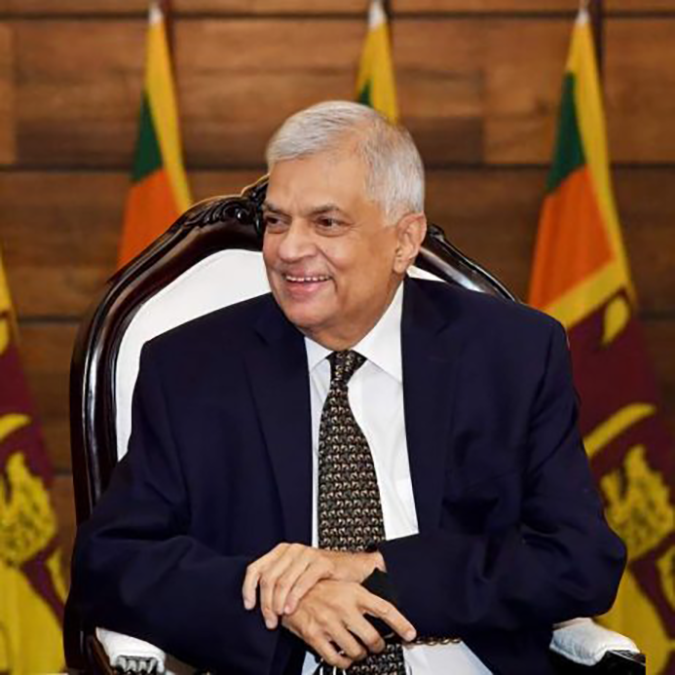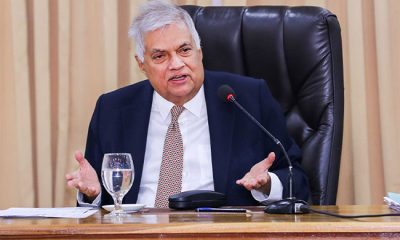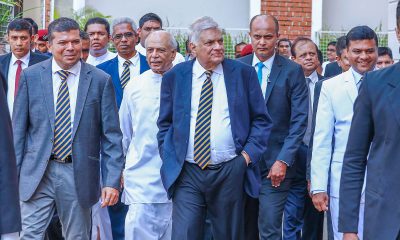News
Economic levers alone not sufficient to stimulate global economic recovery – President

Unlike the financial crisis of 2008, the economic levers alone were insufficient to stimulate global economic recovery in 2022 as what had led to the current crisis was the consequences of evolving geopolitics, President Ranil Wickremesinghe said on Thursday at the ADB’s 55th annual meeting.
“The Ukraine war on one side and the US-China rivalry, spurred on by military, trade and political differences, on the other side, are key contributors to this breakdown in cooperation. Added to the geopolitical rivalry are the droughts, floods and pandemic which are still present in Asia. All these challenges are compounded by the absence of global leadership – a time when the global economy is stuttering. As this global rivalry intensifies into a new cold war, which will determine a new global power balance by 2050, the inability of the major countries to give leadership to the mitigation of the global climate change crisis is becoming more apparent,” he said.
Unless these issues are addressed, the developing nations of Asia are facing a bleak future, he said. Surging inflation, tighter monetary policies, decline in European output, weakening of exports is leading to weaker economic prospects for South Asia and East Asia is the current reality, he said.
Wickremesinghe said Asia is witnessing new alliances cutting across the geopolitical rivalries to mitigate global climate change further highlighting the absence of a common approach on this subject that is vital for our existence. The geopolitical rivalry to determine the contours of the Asian power balance by the mid-century has resulted in the inability of the major countries to give leadership to overcoming the key crises that are threatening the prosperity of the region.
“The resolution of these major economic and environmental issues is unfortunately interwoven with the global geopolitical crisis. As they say in many of our countries, when the elephants fight, it is the grass that is crushed. This is the predicament of many of our member countries. Therefore, we must overcome the geopolitical rivalries to address the major threats to our existence, otherwise we will all fail leading to instability in our region reminiscent of Europe after World War I. On the other hand, our ability to successfully meet these challenges will lead to remarkable progress in raising the living standards of our people through the rise of the economies of our member countries,” he said.
Supply chain shocks created by the Covid pandemic, prices of global commodities mainly food, fuel and fertiliser skyrocketing due to the Ukraine war has led to stuttering the growth of middle class and has resulted in further insecurity amongst the vulnerable communities in the Indian Ocean region, the President said.
“As a result of these shocks, there has been a spike in sovereign debt distress across emerging markets. The growth targets, both in East Asia and South Asia, have been revised downward. If this is not promptly addressed, it risks creating contagion of debt distress that threatens growth and financial stability across all economies. Countries with pre-existing economic vulnerabilities, including Sri Lanka, are the most affected. Therefore, creditors and debtor nations must work collectively in an equitable manner to ensure economic and financial stability across the region and indeed the world,” he said.
Wickremesinghe said that these developments on the global stage have further aggravated the self-inflected economic crisis in Sri Lanka resulting in a political outburst that led to a change in Government. However, the present administration has stabilized the economy and many countries and stakeholders are keenly monitoring how we resolve this crisis, he said. The President said that many nations are keenly watching developments in Sri Lanka to see how the country works with all stakeholders to resolve this crisis.
“We are well aware that the evolution of Sri Lanka’s economic crisis includes both domestic policy elements as well as external shocks. It follows that the resolution of the crisis also requires both domestic efforts and the support of external partners. It is incumbent upon Sri Lanka and our creditors and partners to set an example of how collaborative and good faith action can result in sustainable and equitable solutions to sovereign debt issues,” he said.
Sri Lanka has already undertaken major macroeconomic policy reform measures, Wickremesinghe said. Sri Lanka has now reached a Staff-Level Agreement with the International Monetary Fund on a four-year programme supported by the Extended Fund Facility. The programme is aligned with the commitment of the Government to implement an ambitious and comprehensive package of reforms that will help restore the sustainability of our public finances, addressing external imbalances, and restarting Sri Lanka’s growth engine through structural reforms and improvements in governance.
“Amidst major economic stress, Sri Lanka is undertaking an unprecedented fiscal effort as part of our commitment to restoring the country’s debt sustainability. It is our hope and expectation that Sri Lanka’s creditors, and all stakeholders, will support us in these efforts to restore our debt sustainability and help put the country back on the path of inclusive and sustainable economic growth,” he said.
News
US sports envoys to Lanka to champion youth development

The U.S. Embassy in Colombo welcomed the U.S. Sports Envoys to Sri Lanka, former National Basketball Association (NBA) and Women’s National Basketball Association (WNBA) players Stephen Howard and Astou Ndiaye, from June 8 through 14.
The Public Diplomacy section of the U.S. Embassy said that it would launch a weeklong basketball program intended to harness the unifying power of sports, made possible through collaboration with Foundation of Goodness and IImpact Hoop Lab.
While in Sri Lanka, Howard and Ndiaye, both retired professional basketball players, will conduct a weeklong program, Hoops for Hope: Bridging Borders through Basketball. The Sports Envoys will lead basketball clinics and exhibition matches and engage in leadership sessions in Colombo and Southern Province for youth aged 14-18 from Northern, Uva, Eastern and Western Provinces, offering skills and leadership training both on and off the court. The U.S. Envoys will also share their expertise with the Sri Lanka Basketball Federation, national coaches, and players, furthering the development of basketball in the country. Beyond the clinics, they will collaborate with Sri Lankan schoolchildren to take part in a community service project in the Colombo area.
“We are so proud to welcome Stephen and Astou as our Sports Envoys to Sri Lanka, to build on the strong people-to-people connections between the United States and Sri Lanka,” said U.S. Ambassador Julie Chung. “The lessons that will be shared by our Sports Envoys – communication, teamwork, resilience, inclusion, and conflict resolution – are essential for leadership development, community building, equality, and peace. The U.S. Sports Envoy program is a testament to our belief that sports can be a powerful tool in promoting peace and unity.”
News
Rahuman questions sudden cancellation of leave of CEB employees

SJB Colombo District MP Mujibur Rahuman in parliament demanded to know from the government the reasons for CEB suspending the leave of all its employees until further notice from Thursday.
MP Rahuman said that the CEB has got an acting General Manager anew and the latter yesterday morning issued a circular suspending leave of all CEB employees with immediate effect until further notice.
“We demand that Minister Kanchana Wijesekera should explain this to the House. This circular was issued while this debate on the new Electricity Amendment Bill was pending. There are many who oppose this Bill. The Minister must tell parliament the reason for the urge to cancel the leave of CEB employees,” the MP said.However, Speaker Mahinda Yapa Abeywardena prevented Minister Wijesekera responding to the query and said that the matter raised by MP Rahuman was not relevant.
News
CIPM successfully concludes 8th Annual Symposium

The Chartered Institute of Personnel Management (CIPM) successfully concluded the 8th Annual CIPM Symposium, which took place on 31st May 2024. Themed “Nurturing the Human Element—Redefining HRM in a Rapidly Changing World,” the symposium underscored the pivotal role of human resource management (HRM) in today’s dynamic global landscape. Since its inception in 1959, CIPM has been dedicated to advancing the HR profession through education, professional development, and advocacy, solidifying its position as Sri Lanka’s leading professional body for HRM.
Ken Vijayakumar, the President of the CIPM, graced the occasion as the chief guest. The symposium commenced with the welcome address by the Chairperson, Prof. Arosha Adikaram, followed by the Web Launch of the Symposium Proceedings and Abstract Book by the CIPM President. The event featured distinguished addresses, including a speech by Chief Guest Ken Vijayakumar, President of CIPM, and an address by Guest of Honor Shakthi Ranatunga, Chief Operating Officer of MAS Holdings Pvt. Ltd., Sri Lanka.
The symposium also featured an inspiring keynote address by Prof. Mario Fernando, Professor of Management and Director of the Centre for Cross Cultural Management (CCCM) at the University of Wollongong, Australia.
Vote of Thanks of the inauguration session was delivered by Dr. Dillanjani Weeratunga, Symposium Co-chair.
The symposium served as a comprehensive platform for researchers to present their findings across a wide range of critical topics in HRM. These included Cultural Diversity and Inclusion, Talent Development and Retention, Ethical Leadership and Corporate Social Responsibility, Adapting to Technological Advancements, Mental Health and Well-being at Work, Global Workforce Challenges, Employee Empowerment, and Reskilling and Upskilling.
The plenary session was led by Prof. Wasantha Rajapakse. Certificates were awarded to the best paper presenters during the valedictory session, followed by a vote of thanks delivered by Kamani Perera, Manager of Research and Development.
The annual symposium of CIPM was a truly inclusive event, attracting a diverse audience that spanned undergraduates, graduates, working professionals, research scholars and lecturers. This widespread interest highlights the symposium’s significance in the field of HRM, offering a unique opportunity for everyone to network and learn from scholarly brains.The CIPM International Research Symposium was sponsored by Hambantota International Port, Sri Lanka Institute of Information Technology (SLIIT), E B Creasy & Co. PLC, and Print Xcel Company.
























